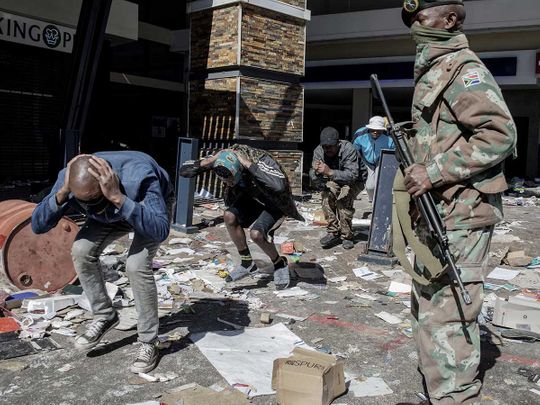As calm is slowly returning to the streets of KwaZulu-Natal and Gauteng provinces of South Africa, businesses and citizens are beginning to count the cost of week-long violence. The protests which were triggered by the jailing of former president Jacob Zuma for contempt of court quickly degenerated into scenes of lawlessness.
In a televised address to the nation on Friday evening (16/07/2021), President Cyril Ramaphosa described the past week’s events as “attempted insurrection.”
“The ensuing chaos is used as a smokescreen to carry out economic sabotage through targetted attacks on trucks, factories, warehouses and other infrastructure necessary for the functioning of our economy and the provision of services to our people,” he said.
Security agencies in South Africa are investigating twelve individuals believed to have played a hand in instigating the violence. Most of them linked to Mr Zuma’s administration. Already, a former senior security agent allied to the country’s spy unit has been arrested.
As of Friday, at least 212 people had lost their lives in the violence. 180 in KwaZulu-Natal and 32 in Gauteng. Additionally, more than 2,550 people have been arrested in connection with the unrest and the government is promising speedy processing of their prosecution.
In his speech, the president said that the chaos witnessed in the country caused extensive damages to 161 malls and shopping centres, 11 warehouses, 161 liquor outlets and eight factories. There were also significant damages to infrastructure such as roads, especially in KwaZulu-Natal.
For an economy that was already dealing with the harsh effects of Covid-19 containment measures, the week-long violence is likely to worsen the situation. International consulting firm PwC is already predicting job losses in thousands.
“From our perspective, these events essentially placed key areas of the Gauteng and KwaZulu-Natal economies in a virtual level 5 lockdown,” said a statement from PwC.
While it is still not clear exactly how much damage the country has suffered, some independent economists put the figure at USD 1.5 billion.
Mr Ramaphosa says that his government is at an advanced stage of evaluating what kind of assistance businesses, including small ones, will need to recover. Most of the affected businesses say it will take them months to open their doors.
A team in the Presidency and National Treasury is hard at work to develop a comprehensive support package for Cabinet’s consideration.
We will be in a position to make a further announcement in this regard soon.https://t.co/fFlI9KpMHg
— Cyril Ramaphosa 🇿🇦 #StaySafe (@CyrilRamaphosa) July 16, 2021
He also fell short of indicting his administration’s security establishment of failing to predict and prevent the widespread chaos.
“We must admit that we did not have the capabilities and plans in place to respond swiftly and decisively. Our police were faced with a difficult situation and exercised commendable restraint to prevent any loss of life or further escalation,” he said.
The president defended his reluctance to declare a state of emergency saying it should only be considered as a last resort because it “would allow drastic limitation of the basic rights contained in our constitution, which no responsible government would want to do unless it was absolutely necessary.
The government has deployed a total of 25,000 troops to the streets of the two worst-hit provinces to help the police in restoring normalcy.
The chaos also disrupted the ongoing Covid-19 vaccination exercise and the government is hoping to restore services shortly.
In the short term, it is essential that we get the vaccination programme back on track as soon as possible, and no effort will be spared in that regard.https://t.co/fFlI9KpMHg
— Cyril Ramaphosa 🇿🇦 #StaySafe (@CyrilRamaphosa) July 16, 2021
South Africa has currently imposed a Level 4 lockdown across the country to deal with the pandemic. Events of the last week that saw large gatherings as protestors looted shops and clashed with police and community security are expected to worsen the situation.



